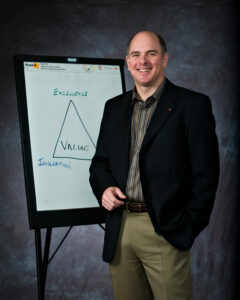THIS ARTICLE IS SPONSORED CONTENT
A CMC is an Invaluable Asset to any Organization
SPONSORED CONTENT
In the world of business, not-for-profits and government enterprise, a Certified Management Consultant or a CMC is an invaluable asset to any organization – big or small.

“What you’re getting when you get a CMC is somebody who can help you in all parts of your business, not-for-profit or government enterprise,” said Doug Macnamara from Banff Executive Leadership. Macnamara is also the board chair and president of the Alberta Institute.
With in consulting, becoming a CMC is the only professional designation an individual can receive, Macnamara noted. The process includes extensive education, a mentorship with a senior consultant or a CMC, work experience in the field and the ability to follow a CMC’s expected set of ethics. “Ethical framework is our universal code of conduct – which has the ethics code integrated into it.”
According to Macnamara, the idea of the highly-respected CMC profession got its start back in the 1940s, when a group of Chartered Accountants (CAs), at the time, recognized there was a need for non-financial consulting and there should be professionals. “So they started the CMC process.”
Canada provides professional designations at the provincial level and the Institute of Certified Management Consultants of Alberta is the professional institute within the province. “It’s a very reputable and fairly wide-spread certification.”
“A national association ensures the course content, certification and exam process is consistent across the country and also with the other 50 countries around the world,” Macnamara pointed out. “It’s an internationally recognized designation. We have reciprocal recognition between all the provinces and all the other countries.”
Some of the core fundamentals taught with managing a business include financial management, operational management, human resource and people management, leadership and governance and strategic thinking and planning.Macnamara’s specialty is in executive leadership development and board governance. “I do most of my work these days in strategic planning.” But, each CMC has a multifaceted set of skills, comprehensive abilities and support.

The ethical framework is very important in the life of a CMC. “Every year, all our members have to re-attest to the professional code of conduct in their ethics,” Macnamara said, adding a CMC is someone a client can trust.
CMC’s are also fiduciaries or professionals obligated to do what’s best for the company or the institution they’re working for. “That’s our focus. We provide an independent and experienced advice,” said Macnamara, adding a CMC is quite focused on a client’s unique needs and what is in the best interests for the client and the organization.
“We also avoid conflicts of interest,” Macnamara said. “It’s about helping the client.”
Shilpa Stocker is involved in managing and consulting with a focus on strategic planning, economic development, business planning and marketing. Stocker is an FCMC (recognized for excellence as Fellow Certified Management Consultant) and sole practitioner from Lethbridge, with clients from Edmonton to southern Alberta. “All of my work is referral. It’s based on clients being happy and getting a level of service and a level of competence.”
“I have been consulting on a full-time basis since 2001. I decided to get my designation fairly early on before I went into full-time consulting, so to get the CMC. Simply because for me, it sets me apart from others,” Stocker said.
The CMC difference, according to Stocker is, being obligated to abide by a uniform code of professional conduct. “Which gives my clients added confidence I will behave in a manner that is becoming of the profession and I can represent my profession well.”
For Stocker, it was advantageous – as part of the certification process there is a common body of knowledge, there are peers Stocker can reach out to for support and there’s professional development. “Which from a client point of view is a big advantage.”
By working with a CMC, there’s a certain level of competence. “There are standards that have been set in terms of competence and conduct that are met. You’ve got that base level,” Stocker said.
When a client hires a CMC, Stocker explained, the client gains a higher level of consulting. “And for whatever reason, if they have questions about the conduct or what not, there’s an institute they can approach, so there’s a body that oversees us to make sure we are following the standards.”
Being a FCMC and working with clients for Stocker is wonderful and amazing work. “You are either helping people seize opportunities or deal with challenges. It’s a variety of industries, a variety of sizes of business and different people from different areas. To me, that’s exciting – in a sense that – you’re interacting and you’re learning along with the client learning because you’re always learning about business, businesses and industry. It’s very exciting to be able to work where there’s diversity in the type of work you do within your specialization.”

-15




